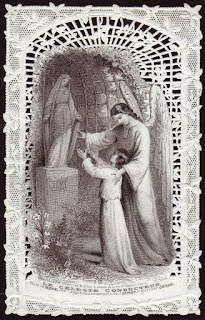 |
| Pope Leo XIII. [1810, 1878-1903] |
On
October 13th, 1884, Pope Leo XIII had a remarkable vision. When he had finished celebrating Mass in his private Vatican Chapel, attended by a few Cardinals and members of the Vatican staff, he suddenly stopped at the foot of the altar. He stood there for about 10 minutes, as if in a trance, his face ashen white. Then, going immediately from the Chapel to his office, he composed the prayer to St. Michael. In 1886, Pope Leo XIII decreed that this prayer to St. Michael be said at the end of "low" Mass throughout the universal Church, along with the Salve Regina (Hail, Holy Queen); and the practice of the congregation praying these prayers at the end of Mass continued until about 1970, with the introduction of the new rite of the Mass.
Here is the prayer to St Michael:
SANCTE Michael Archangele, defende nos in proelio, contra nequitiam et insidias diaboli esto praesidium. Imperet illi Deus, supplices deprecamur: tuque, Princeps militiae caelestis, Satanam aliosque spiritus malignos, qui ad perditionem animarum pervagantur in mundo, divina virtute, in infernum detrude. Amen.
Holy Michael the Archangel, defend us in the day of battle; be our safeguard against the wickedness and snares of the devil. May God rebuke him, we humbly pray. And do thou, Prince of the heavenly host, by the power of God thrust into hell Satan and all the wicked spirits who wander through the world for the ruin of souls. Amen.
 |
| Crowds at Fatima in 1917 |
On
October 13th 1917, 33 years later, a public miracle took place at Fatima which was witnessed by a crowd of some 70, 000 people. The sun danced in the sky before appearing to plunge earthwards. The crowd of onlookers, having waited in torrential rain, suddenly discovered that their drenched clothes were dry. Various miraculous cures were reported. The events were reported even in the anti-Catholic press.
Judah Ruah, for the news paper O Seculo, published in the news paper Illustracao Portugueza [Public domain]
The miracle had been promised earlier that year by Our Lady in her apparitions to three Portuguese children. They had been shown a vision of Hell itself and Our Lady urged them to do penance and to pray the Rosary, including the following prayer after each decade:
"O my Jesus, forgive us our sins, save us from the fires of hell, and lead all souls to Heaven, especially those most in need of Thy Mercy".
Our Lady warned that, if mankind did not turn away from sin, the evils afflicting the Russian people would spread throughout the entire world. This was said in the very month that the Bolshevik Revolution was beginning its war on Christian orthodoxy in Russia, a war against Christ that would indeed spread across all continents from 1917 even to the present day.
On
October 13th 1991, a family rupture occurred which had a devastating impact, with lifelong and inter-generational consequences.
On
October 13th 2009, a formal, sacramental act took place:
Miserere mei Domine (Ps 50).
In
October 2017, as at Fatima, a small but crucial miracle occurred: what had for a long time been soaked became dry. [15]
Qui habet aures audiendi, audiat : He that hath ears to hear, let him hear. [Matt 11]
Mindful of the call to pray the rosary and to place total trust in Our Lady's powerful intercession, I launched the website
Rosarium Aureum in 2018 and the
Little Office of Our Lady in 2019. With hindsight, these two sites flow naturally from the motto I adopted (and adapted) for my own:
Totus tuus ego sum
Et omnia mea tua sunt;
Tecum tutus semper sum:
Ad Jesum per Mariam
[
Totally thine am I And all I have is thine; With thee safe ever am I: To Jesus through Mary]
With the arrival of October 2019, I felt that Our Lady was pointing to her son
Jesus, precisely in the way of the words:
Ad Jesum per Mariam. Accordingly, I decided to begin work on a new site:
The Life of Christ Our Lord. Much of the inspiration and many of the images for the new site come from ''
The Life of Our Lord Jesus Christ'' by James Tissot. My two volume edition of this work contains a facsimile dedication to Monsieur Gladstone, dated ''15 Octobre 1897''. In his introduction, Tissot reveals that he started his research for the book on October 15th 1886.
In view of the confluence of events around the month of October, the month of the Holy Rosary, it seemed altogether propitious to launch the new site on
October 13th.
I place all the work on this site confidently in the hands of
Mary, our gentle Queen and Mother, entreating her to intercede on our behalf with her son
Jesus, Christ Our Lord. The prayers are offered in adoration and praise of God, in thanksgiving, but especially in reparation for sins, begging Our Lord to have mercy on the soul of the author, to protect his family members
[*], and to lead all souls to Heaven, especially those most in need of His mercy.
[*] EEKPTEE and EA. I have disguised the names to respect their privacy on this public site.













